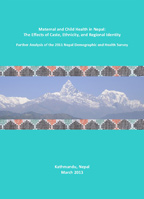- PUBLICATIONS
- JOURNAL ARTICLES
- ACCESS PUBLICATIONS
Publications Summary
Maternal and Child Health in Nepal: The Effects of Caste, Ethnicity, and Regional Identity (English)
- Document Type
- Further Analysis
- Publication Topic(s)
- Child Health and Development, Maternal Health
- Country(s)
- Nepal
- Survey
- Nepal DHS, 2011
- Language
- English
- Recommended Citation
- Pandey, Jhabindra Prasad, Megha Raj Dhakal, Sujan Karki, Pradeep Poudel, and Meeta Sainju Pradhan. 2013. Maternal and Child Health in Nepal: The Effects of Caste, Ethnicity, and Regional Identity: Further Analysis of the 2011 Nepal Demographic and Health Survey. DHS Further Analysis Reports No. 73. Calverton, Maryland, USA: Nepal Ministry of Health and Population, New ERA, and ICF International.
- Download Citation
- RIS format / Text format / Endnote format
- Publication Date
- March 2013
- Publication ID
- FA73
Download
 Maternal and Child Health in Nepal: The Effects of Caste, Ethnicity, and Regional Identity (PDF, 1331K)
Maternal and Child Health in Nepal: The Effects of Caste, Ethnicity, and Regional Identity (PDF, 1331K)
Download this publication
There is no printed copy available to order.
